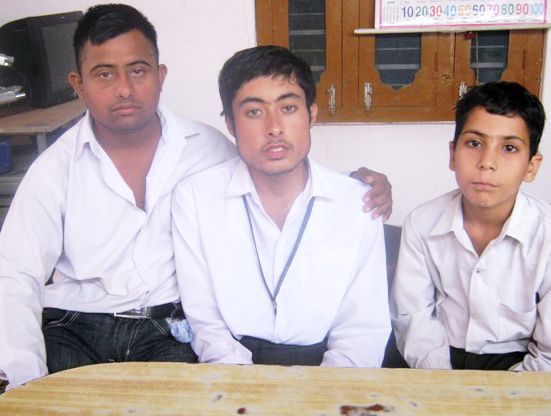Akshay Azad
Eighteen-year old Rakesh, scrambling with last-minute preparations for his visit to Australia, is simultaneously trying to answer the questions being thrown at him about his special journey. The calm confidence in his voice leaves everyone astounded when they realize that he is perhaps the only specially abled boy in the entire history of Jammu region to be selected for the Special Olympics.
Rakesh Kumar, a Downs-syndrome patient, could well have been lost in the swarm of mentally challenged people, who are merely a source of cruel entertainment for people in rural areas, and depend entirely on parents and are restricted to the confines of their homes, had it not been for people like Lalit Kumar and Dr.Ashwani, who showed himthe way forward.
Rakesh, along with seventy other mentally challenged classmates, represents ‘Prerna Institute of Research and Rehabilitation Centre’at RS Pura near Jammu city, where they not only learn to solve mathematics problems but also a new way of life; a place where the teachers impart to them the confidence of living life with respect and independence.
Lalit and Ashwanimotivated and encouraged parents of these speciallyabled children to send their wards to the Institute.Prerna Institute has become a ray of hope for the hapless families of these specially abled children.
“Till the age of 12, Rakesh was confined to his house. Even though he is not violent in behaviour, one member of the family had to be with him all the time. Being Army Personal, his father wasn’t there most of the times, making it solely my responsibility to take care of him,” shares Rakesh’s mother, Kanta Devi, her excitement at the selection of her son in the Games evident from the glow on her face. Initially, her family was not in favour of sending their child to the Rehabilitation Centre but after Lalit’s constant efforts, they finally agreed.
“Now my son is selected for the Special Olympics and will be visiting Australia. The youth of the village, who had been making fun of Rakesh all these years, are now jealous of him,” she laughs, adding thatRakesh has made his family proud. Like Rakesh’s family, seventy other families are equally thankful to Prerna Rehabilitation Centre being run by “Sehyog India”, a non-profit organisation. The persistent efforts of Sehyog India have brightened the future of these children. The weak financial condition of the NGO is an inevitable bottleneck, creating impediments for the optimal growth opportunities offered to these bright children to taptheir hidden talents.
State Trainer of Special Olympics, KamaljeetKour, says that six children of the institute were selected for the Special Olympics this year. “Though our six children were selected,owing to our weak financial conditions (as one player needs atleastRs. 80,000),we cannot afford to send even a single student to Australia,” rues Kour. However, since it is the first time that selections have been made from Jammu, they have decided to send at least one child for the Games.
A social worker and Area Coordinator of the Special Olympics, Lalit Kumar, has his own story to share on what inspired him to work for these mentally challenged children.
Lalit’s elder sister, also mentally challenged, made him realise the stigma she, and others like her, have to face virtually all their lives. After his father’s death and marriage of the other siblings, the responsibility of looking after his sister fell on his mother’s shoulders who, despite being a social worker, was forced to confine herself to the house with her daughter.
This realization made Lalit sensitive to the needs of speciallyabled children, especially girls, who are more prone to violence. His mother stopped visiting even her mother’s house as they realised that instead of being polite with the child, people are more often harshharsh and make fun of them with cruel insensitivity. “We feltreally embarrassed, as my sister was called “Jhalli” in the locality and whenever relatives or locality members visited our house, they would hold a cloth on their noses to avoid the smell from her soiled clothes or bedding,” shares Lalit.
“I started reading books and visiting Rehabilitation Centres. I realized that these special children can be rehabilitated and they can become independent if some basic training is imparted to them during their early childhood. This idea motivated me to get associated with the Special Olympics.”
As part of his job, Lalit also did some surveys for the Special Olympics that revealed many saddening facts regarding the situation of mentally challenged children in the state.
During the survey of two Panchayats of District Samba, a startling fact that came to lightwas that there are 672 handicapped children, including mentally challenged, in the area. “Out of 672 children, a mereeight children receive pension and only 70 have the Handicapped Certificate. We took up the matter with the Deputy Commissioner and also with the Social Welfare Department for providing them various benefits under government schemes, but all in vain”, he recalls.
Founder President of Sehyog India, Ashwani, explains that since Jammu and Kashmiris not a member of National Trust, they are not eligiblefor any benefit of many Centrally-sponsored schemes. On the other hand, there is negligible work being done by the State Government for the welfare of these children.
“There is no help from the Government but at the same time we do realise that there areonly a handful of rehabilitation centres for speciallyabled children in our region. We have decided to make a complete rehabilitation centre for these children, which will have capacity to house 400 children and offer activities that will help them carve an identity of their own in this highly competitive world,” shares Ashwani.
(The Writer is a SanjoyGhose Media Fellow)
Charkha Features
Trending Now
E-Paper


